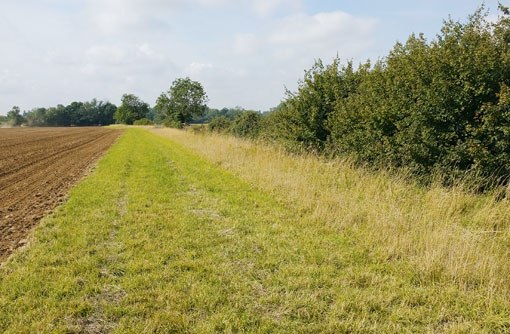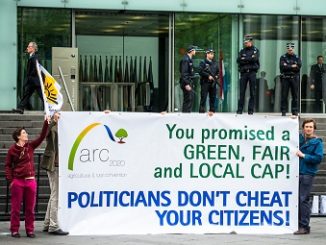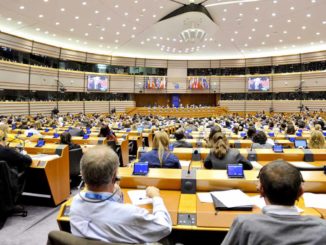
‘CAP-itulation’ – EU Commission gives up further EFA criteria
In response to changes in the Delegated Acts ARC2020 has released the following press release. […]

In response to changes in the Delegated Acts ARC2020 has released the following press release. […]

(Brussels, 22/11/2013) BEGINS The European Parliament held its final vote on Wednesday 20th November on the Common Agricultural Policy (CAP). In voting as it did, Parliament has it intensified the failure to deliver what was supposed to be a fairer, simpler and greener agriculture policy for Europe. ”Business as usual has prevailed at 90%” said Benedikt Haerlin of NGO platform ARC2020.EU and Meine Landwirtschaft. “Unfortunately the role of the European Parliament had been to substantially cut back on the initial progress towards sustainability proposed by the European Commission. From 2014 to 2020 we will see at least as many farms being closed down within the European Union, organic farming will suffer financially, biodiversity will suffer even more and the role of the European Union in the world will continue to be a resource-sucker at the expense of the global poor and the environment.” Importantly, all amendments, some of which could have improved the proposals, were dropped and not voted on. This democratically questionable move occurred due to a change in the voting order of the overall EU budget […]

(Brussels, 02/10/13) BEGINS On Monday the European Parliament’s Agriculture Committee (COMAGRI) voted on the remaining issues on CAP reform. This follows the substantive agreement in June in Ireland and the final trilogue between Parliament, Council and Commission last week, where the Council strong-armed the Parliament into ceding its position, aided by the Commission. The committee vote still needs to be confirmed by Parliament as a whole in a plenary vote at the November session. “The co-decision procedure on CAP reform has been a long, epic process, full of delays and brinkmanship. In the end however, it also represents, unfortunately, a missed opportunity to really, radically reform the CAP. The momentum now turns to member states” Samuel Feret, ARC2020’s coordinator said. Substantial reform has been bypassed in favour of business as usual, questioning the whole notion of co-decision making and trilogue. The Council, together with anti-reform COMAGRI members opposed capping payments to even the wealthiest, while watering down greening with exemptions and loopholes and maintaining polluting and export dumping practices. Specifically The COMAGRI vote dealt with outstanding issues on DP (Direct Payments), CMO (Common Organisation of Markets), RD (Rural Development) and HZR (Horizontal Regulations). […]

Press Release: Action in Luxembourg ahead of decisive meeting on CAP reform […]

PR ahead of EU Council […]

Transitional measures in place […]

Corporate Europe Observatory Press Release […]

Tool for Structural Funds […]

INSTITUTIONS: Council Presidency (Coveney) – Press Release on the Results of Ag Ministers Meeting 26/06/2013 Irish Presidency – Historic day for the Common Agricultural Policy EU Parliament: – EU farm policy after 2014: MEPs, Council and Commission strike a political deal European Parliament, Commission & Council – Video of Press Conference (Original with subtitles) EU Commission – Political agreement on new direction for common agricultural policy EU Commission – CAP Reform: an explanation of the main elements NGOS: ARC2020 – CAP deal weak but options worth fighting Friends of the Earth – CAP reform: failure for environment and small farmers IFOAM EU – CAP deal lacks strong and credible steps towards sustainability Slow Food – CAP Not Good Enough EEB – Green CAP Reform in Tatters WWF – Environment in danger because of EU agriculture deal OTHERS: CAP2020 – Political Agreement on the CAP – is this really a paradigm shift for the environment? Institute for European Environmental Policy (IEEP) – Environment undermined in CAP deal COPA COGECA – Uncertainty ends but devil in the […]

Farm policy reform plans debated by ministers and MEPs in Brussels […]

Farm policy reform: cut bureaucracy for farmers and rethink greening measures, says Agriculture Committee […]

Press release from the Agriculture and Fisheries Council meeting in Luxembourg on 20-21 October 2011 […]

The European Parliament’s Committee on Agriculture and Rural Development is currently working on an own-initiative report “CAP towards 2020: meeting the food, natural resources and territorial challenges of the future” and the different political groups are now trying to find a common ground. This is done by agreeing on compromise amendments to the draft report which are meant to reduce the large number of amendments tabled by the committee members. The current draft compromise amendments, proposed by the rapporteur Albert Dess, are expected to reduce the number of amendments to be voted from 1300 to around 1000. But the staff of political groups continues exchanging views and believes that more work needs to be done in order to further reduce the sheer number of amendments and achieve a substantially shortened text. The report will need a concise structure and an unmistakable wording if the European Parliament, with its new co-decision powers, wants to send a clear and strong message to the European Commission and the Council of the Member States. Unsolved key points are the […]
Agricultural and Rural Convention